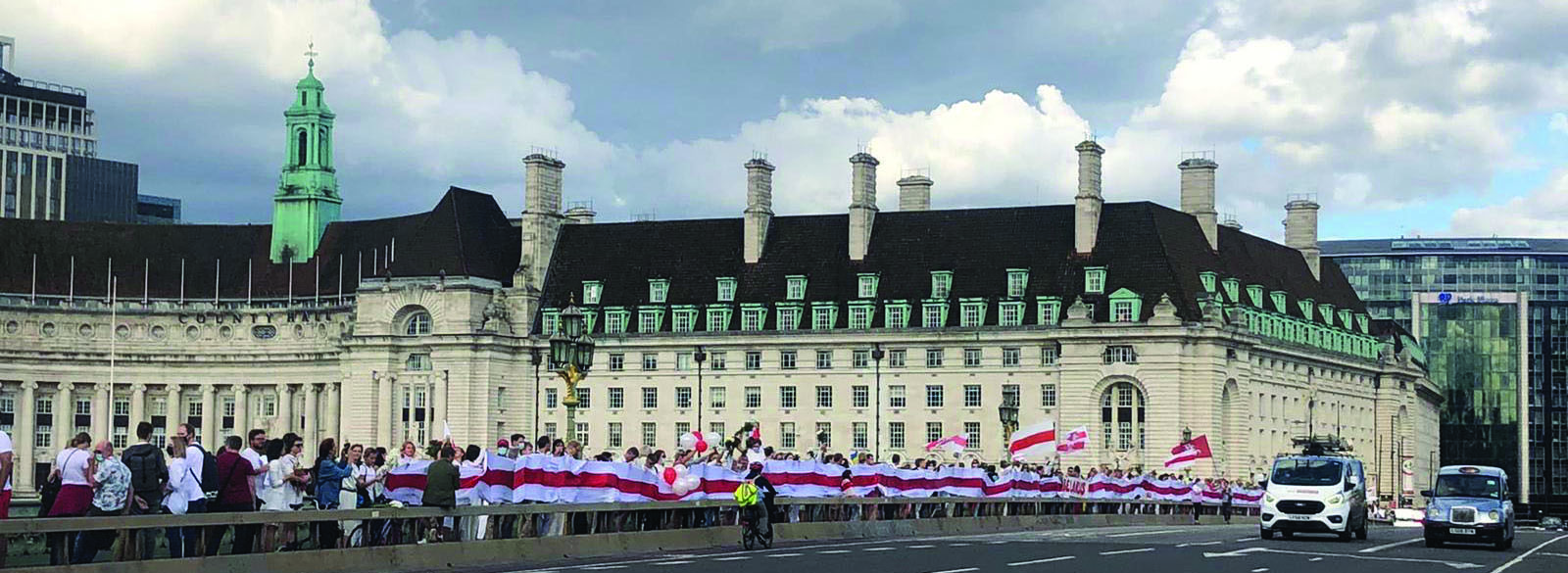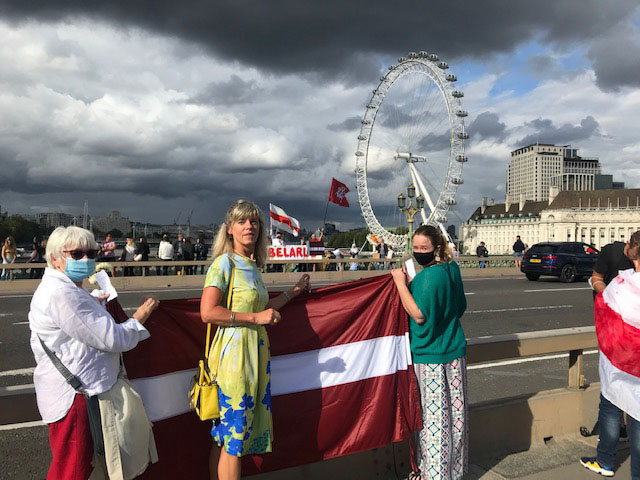One of the main activities of the Latvian National Council in Great Britain (LNPL), which was founded on 11 November 1950, was the provision of internal and external information both to the Latvian public and in cooperation with the British authorities. One of the first serious tasks of the LNPL was to gather materials for the commission established by Charles J. Kersten in 1953 in the United States. The commission collected information on the history and occupation of the Baltic states. Beginning in 1951, church services were held in the largest Latvian centres in memory of compatriots deported by Soviets in the 1949. In 1954, approaching this memorial day, the LNPL Information Branch prepared 16,000 leaflets, which were distributed at memorial events organized by Latvian centres.
In 1956, awaiting the visits of Soviet leaders Khrushchev and Bulganin to Great Britain, the LNPL from 18 April proclaimed a mourning period of 10 days for Latvians. 18,000 leaflets were prepared and distributed, and a special newsletter was sent to the 23 largest daily newspapers, which used them in their publications. Protest marches took place in many Latvian centres. In London, a protest march was organized by the LNPL from Brompton Oratory to Whitehall, where a wreath was laid at Cenotaph. These actions strengthened the political importance of the refugees and raised the profile of the LNPL. In 1957, after a long correspondence, it was possible to place articles favorable to Latvians in the 1957 edition of the Encyclopaedia Britannica. Articles were published on Latvian language and literature, Latvia and Latvians.
From 1958, the Baltic Council undertook to organise the memorial events for the deportees together with Latvians, Lithuanians and Estonians The services and concerts usually took place in the larger cities of England. In 1960, there were concerns that the USSR could misappropriate state funds deposited in London by the pre-war Republic of Latvia, and that the occupation of Latvia might be recognised. Then news appeared in the British press that a legal formula had been found that would allow the use of Baltic funds without recognition of the occupation. From that moment on, a long struggle began at various levels and with different methods of protest for Latvian gold until 1993.
On 6 February 1967, the visit of the Prime Minister of the USSR Council of Ministers Kosigin was planned in London. LNPL prepared instructions for protests and distribution of materials, calling for refraining from terrorist methods and disturbing public order, but to reaffirm that our nation categorically rejects the Bolshevik regime imposed on it and demands an end to the violent Soviet occupation of Latvia. Extensive demonstrations took place in many Latvian centres with the demand to restore Latvia's right to self-determination. The agreement reached on the use of Baltic gold during Kosigin's visit caused great outrage in the exile press. At the initiative of the LNPL, a memorandum was drawn up on behalf of all three Baltic States and sent to a large number of Members of Parliament and the House of Lords. Protest letters were written to Members. On the occasion of the 50th anniversary of the Bolshevik Revolution, the Foreign Affairs Circle had organized a protest demonstration of oppressed peoples in the Albert Hall in London, to which the LNPL prepared and distributed leaflets. 1968 had been declared the International Year of Human Rights by the United Nations, so the LNPL prepared an application to the British Foreign Minister for non-compliance with human rights in occupied Latvia.
A new form of protest began in 1969 and continued in the 1970s. The British League for European Freedom began to organise Repressed Nations Weeks with different events in major English cities. Their aim was to acquaint the widest possible sections of British society with the fate of the Baltic states. Conferences, exhibitions, church services, intercessions, demonstrations, wreath-laying processions at the monuments of fallen soldiers were organized. The LNPL took an active part in organising these events, inviting compatriots to take an active part in all protests, as well as to write letters to the British Prime Minister this week. Sample letters were published in the “Londonas Avīze” newspaper. Special stamps were also issued to be glued to the envelopes. For example, the stamp issued in 1971 depicts a map of Eastern Europe, being trampled by a KGB officer with a red star on a sickle and a hammer on his chest. In 1971, a Red Army song and dance ensemble visited England, and was greeted in London and Leeds with protest demonstrations, stink bombs and leaflets, where the dancers of “Kamoliņš” were especially active.
In 1974, the government of the Prime Minister of Australia Gough Whitlam decided to de jure recognize the occupation of Latvia. Memoranda were prepared and extensive protests were held. A year later, the Australian government revoked its decision to recognize the occupation of Latvia. In 1975, the European Security Conference was held. LNPL prepared an application and submitted it to the British Foreign Minister on behalf of the Baltic Council. The subsequent reply confirmed that "Her Majesty's Government continues not to recognize the de jure incorporation of the Baltic States into the Soviet Union and that it does not intend to give final effect to the final agreement of the European Security Conference in Helsinki or to legitimize existing de facto European borders". During the conference, LNPL printed and distributed several thousand copies of the World Baltic Association Memorandum. During the Song Festival in Leicester, the LNPL organized a procession of freedom and the laying of a wreath at the monument to soldiers who fell in the war. During a visit to London by Shelepin, a member of the Soviet government, extensive demonstrations of oppressed nations took place in Hyde Park and leaflets were distributed to draw the attention of the British public. LNPL prepared and distributed a large number of leaflets in connection with the persecution of the families of Gunārs Rode, Pastor M. Grīvāns, Šmits and Brūveri in occupied Latvia. In 1980, LNPL supported the “Action Light”. This was a group of Latvian human rights defenders formed by Pastor Pauls Kļaviņš to support the compatriots persecuted in their homeland. With the support of the group, several Latvian dissidents managed to leave the USSR.
Materials on russification in Latvia and persecuted freedom fighters were prepared and submitted to the European Security Conference, which continued its work in Madrid. During 15-21 November, Augusts Abakuks, chairman of the LNPL Executive Committe, took part in protests in Madrid. The biggest protests against the USSR regime took place on 25-26 July 1985. The Baltic Tribunal initiated by the PBLA to prosecute violations of the USSR in the Baltic states took place in Copenhagen in June. The second event that thrilled the exile community was the voyage of the Baltic Peace and Freedom Ship from 25 July to 1 August 1985, coordinated with the Copenhagen Tribunal and the 10th anniversary of the Helsinki Conference on Security and Co-operation in Europe.
The program of the trip began in Copenhagen with a demonstration, continued along the coasts of Latvia and Estonia with reports, musical performances and throwing a wreath into the sea, commemorating the countless lives lost by the Baltics. Young people from England took part in the trip – dancers and singers of folk dance groups, united in the ensemble "Overseas Scandinavians". On 28 July, the participants of the cruise adopted a declaration demanding the withdrawal of the USSR military forces from the Baltic states, the holding of a people's plebiscite on the restoration of independence, and the creation of a nuclear-weapon-free zone in Northern Europe. The first anti-Soviet demonstration was held in Helsinki, which won the full support of the Finnish people. In Stockholm, the trip ended with meetings and seminars with the participation of prominent public figures.
During the demonstration, several young people chained themselves to the gates of the USSR embassy. About 2000 articles about this cruise appeared in the press of many countries. In 1986, a new problem arose: the issue of war criminals, which was raised with the British government by the Wiesenthal Center in Los Angeles, accusing 17 people of war crimes. In order to refute the unjustified slander of all Baltic people in the press, the LNPL, together with the Baltic Council, drafted a declaration and widely disseminated it in the press. The debate on this topic lasted for many more years, but the Baltic Council was more concerned with this issue.
Following the Chernobyl disaster, a request was sent to the British government to make the strongest protest against the USSR's secrecy about the scale of the disaster. The Baltic Council produced a color brochure on the Baltic states, which was used in different political actions, such as the Conference on Security and Co-operation in Europe in Vienna on 3-9 November 1986. 1987 brought changes in Latvia, popular mass demonstrations began, also called the “Third Awakening” of the people. More active co-operation between exiled and Latvian national political activists began. The Western press was now paying much more attention to the Baltic states.
Now the LNPL focused on informing the public about the events in Latvia, organising contacts of exiles with activists in Latvia, supporting the Latvian People's Front, publishing regular reports in English on events in Latvia, protesting against the influx of migrants into Latvia in Western political circles. After the events of 1991, the most important tasks of the LNPL were to help Latvia break free from the USSR, to gain more Western support, and to promote democratisation processes in Latvia.
After the renewal of Latvia's independence, other priorities faced the LNPL: restoration of Abrene's borders, withdrawal of occupation troops from Latvia, refutation of Russian slander over the repression of national minorities, participation of British Latvians in the Saeima (Parliament) elections, support for education in Latvia. At the end of the 1990s, an important task was to promote Latvia's accession to NATO and the European Union. In 1997, the LNPL initiated letter-writing campaigns for candidates for the next parliament, demanding their support for the wishes of the Baltic States. It was decided to hold meetings and discussion evenings with compatriots to discuss important issues: What is exile? What is the future of exile? What to expect from LNPL?
Address by envoy Kārlis Zariņš at the first Latvian broadcast of Voice of America, 3 June 1951, Munich (Germany)
Lecture by author Pauls Kļaviņš on the “Enlightening Movement”. 4 August 1988.
Politisku diskusiju vakars. LNA LVKFFDA 79. fonds.
Politiska diskusija kopā ar Latvijas viesiem. LNA LVKFFDA 79. fonds.
Jāņa Frišvalda uzruna veltīta Gunāram Astram. LNA LVKFFDA 79. fonds.
Gunārs Tamsons. OMF23001 – 47. 18.03.97.
Akcija “Baltijas ceļš. Brīvību Baltkrievijai!” uz Vestminsteras tilta. Londonā 2020. g. 23. augustā.


